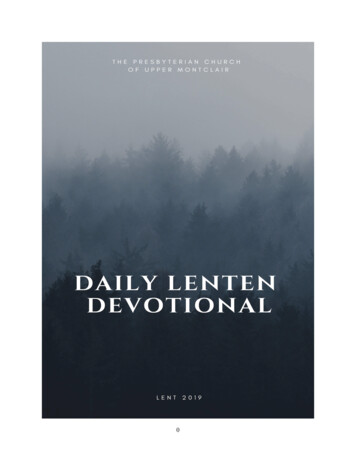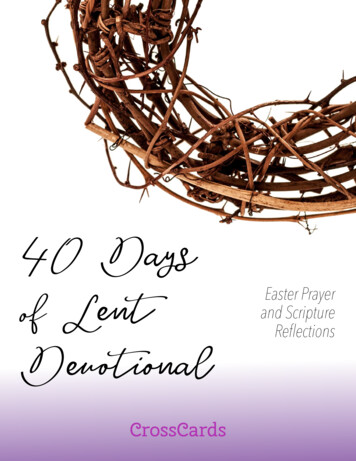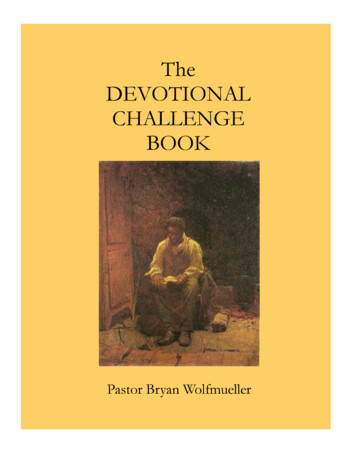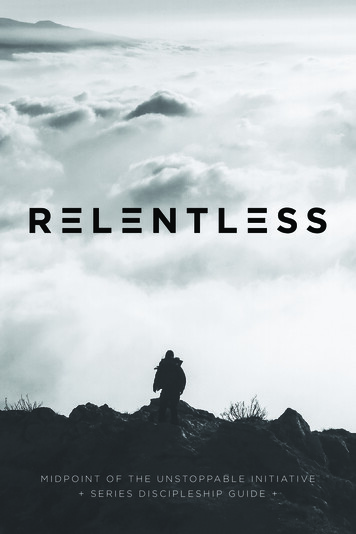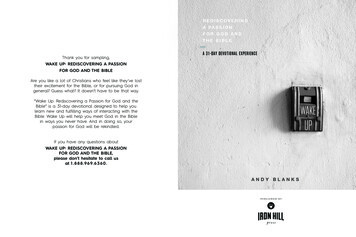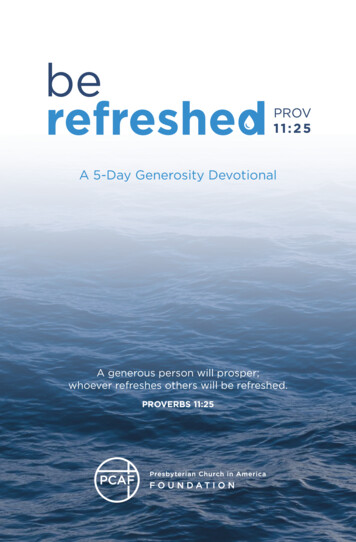
Transcription
A 5-Day Generosity DevotionalA generous person will prosper;whoever refreshes others will be refreshed.PROVERBS 11:251
I have the immense privilege of spending time with fellowChristians who believe God calls them to be generouswith the resources He has entrusted to them. They arenot always wealthy. They are engineers, homemakers,and school teachers who want to invest their resourcesin God’s Kingdom. At the PCA Foundation, we facilitategenerosity to advance God’s Kingdom. Be Refreshed isa 5-day devotional designed for churches, small groups,and individuals who want to think about generositythrough the lens of God’s Word. Our desire is for moreChristians to give more money to see more of God’sKingdom transform more parts of God’s world. May theLord bless you and your church. 2017 by PCA Foundation, Inc. All rights reserved.We hereby grant permission for this book to be reproduced in any formso long as it is reproduced in its entirety, without modification and withattribution to the PCA Foundation. Moreover, reproductions must bedistributed at no cost to recipients. The content of this devotional is alsoavailable at www.pcafoundation.com/berefreshed. You can contact ouroffice for free copies to use with your your church or small group.The content of this devotional was created by Andy Jones, a teachingelder in the Presbyterian Church in America and founder of RoundtreeAgency in Chattanooga, Tennessee.Randel N. StairPresident1
DAY 1READProverbs 11:25“A generous person will prosper; whoever refreshes otherswill be refreshed.”CONSIDERRefreshed. Modern dictionaries define it as being restoredto strength or having a renewed supply. What comes toyour mind when you think of being refreshed? A drink of cold water in the middle of a long hike. A relaxing vacation after a stressful period of work. An unexpected check in the mail when money is tight.Refreshed. It’s when you finally have something you’vereally needed. When you are refreshed, the world looksbetter and you feel better about your place in it.wholeness according to His design.Think of it another way: God’s design is for us to growthrough the giving of resources (skills, gifts, time,possessions, etc.) He’s entrusted to us. We tend to think wediminish our resources when we give them away. The Biblesays faithful giving does not result in us being diminished.Rather, we will be refreshed.If we hand our cup of water to the thirsty, God promiseswe will not go waterless (Matt. 6:31-33). He will satisfyour thirst. As we refresh others, we will be refreshed.Generosity runs counter to our instincts. We want to holdon to our cup of water, fearful it is the only way we can berefreshed.Generosity is also in our own best interest. The pathwayto being refreshed is to refresh others. Other parts of theBible reinforce this: Ecclesiastes 11:1Cast your bread upon the waters for you will find it aftermany days. Luke 6:38God wants us to be refreshed. The Bible also refers to it asshalom, the state of wholeness and joy God designed forus to experience. The Hebrew word “refreshed” in Proverbs11:25 is used in other parts of the Old Testament. Men areinstructed to be refreshed by the love of their wives (Prov.5:19). Wholeness and delight can’t be found in the modernhookup culture. Rather, shalom is found in enjoying yourspouse and giving yourself to them.God makes it clear where we can find refreshment inProverbs 11:25. It isn’t always where we might instinctivelylook. God says refreshment is found in refreshing others.Refreshing others is part of God’s pathway to shalom,2Give, and it will be given to you. 2 Corinthians 9:6Remember this: Whoever sows sparingly will also reapsparingly, and whoever sows generously will also reapgenerously.Every instinct pleads for us to hold on to our money orspend it on personal pleasure. However, generosity is anunselfish act from which we stand to personally benefit:God promises we will be refreshed, whether in this age orthe age to come. We will be refreshed as we refresh others.We gain as we intentionally give.3
DAY 2Giving is key to experiencing shalom. Being refreshed isfound in imitating God and the giving nature of the Father,Son, and Spirit.R.G. LeTourneau’s life is an example of how Godrefreshes us as we give. At one point in his life, the Texasbusinessman was giving 90 percent of his income to theLord. He once quipped, “I shovel out the money, and Godshovels it back—but God has a bigger shovel.” He wasrefreshed as he refreshed others.The generous life is the refreshed life. God is generous. Godcontinuously gives yet He is never lacking. He is supremelygenerous and supremely blessed. May we take Him at Hisword and discover the refreshing power of generosity.APPLY1. We refresh others using gifts, skills, and resources Godhas entrusted to us. In what ways are you using yourgifts, skills, and resources to refresh others?2. Think about the last time you exercised generosity. Haveyou been able to see any ways God refreshed you orothers through it?PRAYFather, we love because we have been loved. We givebecause much has been given to us. Thank You for Yourgenerous gifts in my life and the life of the world. Openmy eyes today to see the world as teeming with Yourabundance. Forgive me when I have been more capturedby greed than motivated by generosity. Open my hands,believing Your promise to fill them again.4READRomans 8:31-33“What then shall we say to these things? If God is for us,who can be against us? He who did not spare his own Sonbut gave him up for us all, how will he not also with himgraciously give us all things? Who shall bring any chargeagainst God’s elect? It is God who justifies.”CONSIDERGod is a giver. It’s part of His nature. We should expectGod to give us good gifts. It’s what He does. God isnaturally generous.Think about the many ways the Bible describes God’sgenerous nature: Genesis 1:27God gives us His image. Psalm 8:6God gives us dominion over His creation. Matthew 5:45God gives rain to the righteous and the unrighteous. Matthew 6:11God gives us daily bread.God is also happy. He is filled with delight. He finds joy ingiving. He does not have to constrain Himself to give goodthings to us. He doesn’t have to work Himself into a certainmood to be charitable to us. In fact, He would have toconstrain Himself to withhold things from us.5
God finds joy in giving us good gifts. When we doubtGod’s generous nature, Paul encourages us to considerthe gospel of Jesus Christ. Jesus is the Son in whom Goddelights. What does He do with His Son? He gives His Sonto us. We can never be separated from this gift becausenothing will ever separate us from the love of God in Christ.As Christians, we should expect God to be generousbecause the history of our relationship with Him ischaracterized by generosity, from creation to Christ.Every Christian sometimes doubts God’s goodness andgenerosity. We think of Him as somehow reluctant orhesitant to bless us. Rather, Paul tells us we should expectGod to “graciously give us all things.”How would your life as a Christian change if you believedGod would “do far more abundantly than all that we askor think” (Eph. 3:20)? Among many things, you wouldlikely be more generous with your own gifts, skills, andresources. You would feel free to give while trusting in Godto supply all your needs.God is a fountain of goodness. God gives and does notdiminish His resources in the process. In other words,God always has more to give. When it comes to God’sgenerosity, John Calvin wrote, “We may assure ourselvesthat He is the fountain which never dries up, nor can everbecome exhausted.”divine. What does it mean to be like God? In part, it is tobe generous and delight in giving gifts. At the heart of theChristian faith is the simple truth, “For God so loved theworld, that He gave.” (John 3:16).The good news is God gives. He gives us His Son, His Spirit,and His promises. He invites us to imitate Him and berefreshed through the joy of giving.APPLY1. Think about the gifts God has given you over the pastday. List items, no matter how trivial they may seem. Taketime to thank God for His generosity in your own life.2. If you could imitate God and give one thing today toone person in your life, what would it be? Why?PRAYFather, help us to believe in Your joyful generosity. Increaseour faith as we consider the sacrificial gift of Your Son. Bythe power of Your Spirit, produce the fruit of giving in ourlives. Open our eyes to see Your generosity all around us,be thankful for Your many gifts, and seek to reflect Yourcharacter in our own lives. We praise You that You aregood and that Your mercies endure forever!God gives and yet never lacks. God refreshes others whilealways being refreshed. God invites us to experiencethe joy of replenishment through our own generosity.We refresh others through sacrificial giving with theexpectation we ourselves will be refreshed.If we want to be refreshed then we must be imitators ofGod as His deeply loved children (Eph. 5:1). Generosity is67
GO DEEPER.Generosity: An OldTestament Perspective“Everything you have is God’s.Everything you have is on loan fromGod.” This is Dr. Scott Jones basicassessment of the Old Testamentteaching on generosity. For more thanten years, Dr. Jones has served as theProfessor of Biblical Studies at CovenantCollege. His particular area of researchand teaching is the poetry of the OldTestament, especially Job.Dr. Scott JonesWe sat down with Dr. Jones to gain a better understanding of theOld Testament perspective on generosity. He explains the role ofwealth and charity in the ancient Near East and its implicationsfor Christians today especially as it pertains to justice.God gave His people substantial blessings in the Old Testamentthat came in material form (ex: land, temple, wealth). What isthe general attitude toward wealth in the Old Testament?Dr. Jones: In the Old Testament, wealth is a form of honor andis something desirous. There’s nothing inherently wrong withworking and producing wealth from your work. In fact, it is avirtue to be pursued. At the same time, it’s not an end in-andof itself. You can think of it along the lines of the Abrahamicnarrative. In Genesis 12, God says, ‘I will bless you, and you will bea blessing.’No doubt, blessing in the Old Testament often came in the formof material wealth. In the Old Testament, blessing is not divorcedfrom a religious worldview, but it does deal with material goods.Look at Solomon: He was blessed with wealth, and the nationsaround were subsequently blessed by his wealth.8What sort of responsibility came with these material blessings?Dr. Jones: This honor also carries with it a duty—maybe even aburden. Those duties and burdens, in particular, are related togenerosity, sharing the wealth. Proverbs 19:17 immediately occursto me in this connection:“Whoever is generous to the poor lends to the Lord,and he will repay him for his deed.” (ESV)The ideal was not to imagine someone as blessed in order tokeep it for himself or herself. God is putting people in a positionto mediate this blessing and justice to the world.How did God’s mandate for generosity compare with othernations in the Ancient Near East?Dr. Jones: In the ancient Near East, generosity wasn’t apeer-to-peer activity. People conducted their business attheir local temple, including their charitable giving. Templesfacilitated generosity in a community. However, they were oftencharacterized by corruption. People were charged unjust interestrates on loans while widows, orphans, and strangers wereneglected in the distribution.Israel was called to be a generous and just community. Theywere to be fair in all their dealings and generous toward themarginalized. This would have certainly set them apart fromsurrounding nations.God calls his people to be generous and just. How do justiceand wealth relate?Dr. Jones: Justice is about equilibrium. It’s an acknowledgmentthat not every part of society is the same—there are the have andhave-nots. The issue is, who is going to care for those who areunder-represented? How are the have-nots going to get justice?9
This is where the notion of justice becomes more concrete.Testament.Creating this equilibrium is not merely about something God willdo in the future, but it’s something he expects his people to do inthe present. For those who are in power or those who have, it istheir responsibility to look out for the orphan and the widow.In terms of giving to others—ministries, missionaries and othercharitable outlets—we see many readily able examples inthe New Testament. I think first of the commissioning of theApostles. When Jesus sends them out, he tells them not totake too much. Through God’s provision, they’re taken care of.Secondly, I think of the book of Acts where everyone is takencare of through the generosity of others. Thirdly, you see Paulappealing to the church to give money to the churches inJerusalem.In Babylonian and Mesopotamian culture, kings would makedeclarations where they would call for a justice edict that wouldessentially reset the social equilibrium—the forgiveness of debtsand such. In the Bible, we see this through the year of Jubilee.This idea of resetting the equilibrium is not purely a socialprogram, and it’s not purely a religious program. It’s both. It’sjustice.What connections do you see between the OT practice ofgenerosity and Jesus’ ministry?Dr. Jones: The Year of Jubilee is not just something in the OldTestament. It’s central to Jesus’ ministry. In Luke 4, he said thathe had come to enact the Year of Jubilee—freedom for thedebt prisoners, in essence. The relationship between God andhumans—even sin—is thought of in terms of finance.The idea in the Old Testament is that there is a deficit betweenthe poor and the wealthy—the have and the have-nots. They areto meet each other’s needs. We’re family, and we have to takecare of each other like we are family. There are lots of differentways we can go about doing that, but it’s important to keep inmind the underlying principle of the Old Testament: God gives,so we give.That’s what’s in the Lord’s Prayer: we are in debt to God, andhe forgives debts. This is fundamental. But it also seems to becontingent on us forgiving the debts of others. As you can see,this notion of debt and debtor is a really important concept inrelation to justice, and I don’t think any of this works withoutgenerosity.God forgives, so we forgive. God gives, so we give.What implications do you glean from the OT for God’s peopletoday?Dr. Jones: Everything you have is God’s. Everything you haveis on loan from God. That’s indisputable in the Old and New1011
DAY 3READLuke 12:15“And he said to them, ‘Take care, and be on your guardagainst all covetousness, for one’s life does not consist inthe abundance of his possessions.’”CONSIDERThe famous American novelist John Steinbeck wrote aletter capturing our uneasy relationship with materialwealth:Do you remember two kinds of Christmases? There is onekind in a house where there is little and a present representsnot only love but sacrifice. The one single package is openedwith a kind of slow wonder, almost reverence. Once I gave myyoungest boy, who loves all living things, a dwarf, a peachfaced parrot for Christmas. He removed the paper and thenretreated a little shyly and looked at the little bird for a longtime. And finally he said in a whisper, “Now who would haveever thought that I would have a peach-faced parrot?”Then there is the other kind of Christmas with presents piledhigh, the gifts of guilty parents as bribes because they havenothing else to give. The wrappings are ripped off and thepresents thrown down and at the end the child says, “Is thatall?” It seems to me that America is like that second kind ofChristmas If I wanted to destroy a nation, I would give it toomuch and I would have it on its knees, miserable, greedy andsick.For the first child, the gift is precious, undeserved, and a12source of joy. For the second child, the gifts are obligatoryand unsatisfying. An abundance of possessions doesnot guarantee an abundance of happiness. Material andfinancial affluence cannot bring us shalom.Think about the best meal you’ve ever experienced. Yourtastebuds danced for joy with every bite. You’ve likelyeaten meals since then. If the meal was so good and filling,why do you still continue to eat meals? Because your bodycraves more. As good as the meal was, its effects were onlytemporary.Like food, money can’t make you full. It taste good andmay even appease your appetite for a season but you willwake up ready for more. We all think the next plate ofmoney will be enough but our hearts have an insatiableappetite for more. We don’t know what it is like to havehearts that say “I have enough.”Money cannot give us lasting joy; only God can. We weremade to enjoy everything God has given us but insteadfind ourselves asking, “Is that all?” You can love money allyou want but know that money will never love you back.There are two ends of the spectrum: On one end, there arethose who believe joy can only be found through riddingthemselves of all their money and material possessions. Onthe other end, people seek joy through accumulating moremoney and material possessions. Both are wrong. Being aminimalist or a materialist does not address the real issueof the heart.Jesus reminds us the “refreshed” life comes through beingthankful for all God has givne us and the joyful stewardshipof it.As Steinbeck observed, material wealth often has the13
effect of making us sick not better. God offers to heal usand make us whole by trusting in Him. Money is not a giverof joy; God is. If we take Jesus at His Word, our materialpossessions do not define us. We are not the better forhaving more, and we are not the worse for giving ourwealth away.APPLY1. Complete this sentence: God, help me to trust in Youinstead of .2. Jesus commands us to be on guard againstcovetousness. What part of your life would you ask Himto help you guard against covetousness? Complete thissentence: God, please help me guard againstcovetousness when it comes to . I am weakand need Your power to not be overcome by my owndesires. Help me to believe there is more satisfaction intrusting in You than trusting in it.PRAYJesus, we thank You for Your warnings, protecting us fromourselves and from the devil. Help us to seek first Yourkingdom and put nothing ahead of it. Show us where ourguard is weak and be our strength. Enable us to experiencethe abundant life You offer us. We pray for the faith tobelieve Your words and for the power of Your Spirit to walkin the light of them.DAY 4READExodus 20:1-3“And God spoke all these words, saying, ‘I am the Lordyour God, who brought you out of the land of Egypt, out ofthe house of slavery. You shall have no other gods beforeme.’”CONSIDERThere is no neutrality when it comes to our relationshipwith money. It is either our master or our servant. AsJacques Ellul pointed out, the way we prove money has nolasting power over us is by giving it away to advance God’sKingdom.We all want to be refreshed — to experience a life ofwholeness and joy. We spend our time and energy seekingit either through the true God or substitute god, whichScripture calls an idol. Martin Luther described a “god” asthat from which you expect to receive all good things andthat to which you flee in times of need. We all have a visionof the blessed life and the corresponding god we believecan give it to us. If your vision of the blessed life is stability andpredictability, order becomes an idol. If your vision of the blessed life is authority, power becomesan idol. If your vision of the blessed life is material prosperity,wealth becomes an idol.As Americans, we live in one of the richest places and1415
times in human history. Material prosperity is celebrated asthe ultimate goal of the American dream. One pastor notedgreed is the sin any father would be most likely to overlookin his daughter’s fiancé. Material prosperity is held forth asthe blessing to be desired and money is the god who canbring it to us.Throughout Scripture, God challenges our idols, the veryassumptions upon which our culture is built. Idols aretypically formed by taking something good God providesand allowing it to become a ruthless master instead of ahelpful servant. Money is good. It is a gift from God forwhich we should be thankful. Yet, when we make it an idol,we are wearied instead of refreshed.Your idol is always something you think will give but endsup taking. It is always something you think holds value butends up worthless. Money is a helpful servant. It enables usto be rewarded for our work and provide for our families.Money is meant to be a means, not an end.One way we keep from worshipping money is to giveit away. We treat our money as vain, worthless, andpowerless by being generous with it. Generosity is one waywe work out our salvation with fear and trembling. Everytime we give to the church offering, we testify that moneyis our servant and God is our master. Generous givingkeeps money from having power over us.weary us. It will take our time and energy. Money promisesto give but only ends up taking. We should seek after itthrough honest work. Only God can help us to use it as aservant rather than worship it as a master.We will be refreshed not by focusing on refreshingourselves. Rather, we will be refreshed when we utilize ourresources to refresh the nations with the gospel.APPLY1. Examine your own record of giving to the church andChrist’s Kingdom. Does your giving make money look likea master or servant in your life?2. Develop the habit of giving regularly. Decide not onlyhow much to give but how often to give, whether it isevery week or every month. Giving regularly will helpyou create the habit of generosity.PRAYHoly Spirit, we need the power of the risen Christ toindwell us. We need You to put to death the deeds of theflesh and the idols that enslave us. Help us experiencethe liberty Christ purchased for us and the joy of servingHim as King. We praise You for Your life-giving power andask for You to give us new hearts that give willingly andsacrificially to advance Christ’s Kingdom.In a money-obsessed world, generosity looks foolish.The only power for generosity is a new heart with newpriorities. As Robert Murray M’Cheyne preached, “To givelargely and liberally, not grudging at all, requires a newheart; an old heart would rather part with its life-bloodthan its money.”If we make an idol of money, it will not refresh us. It will1617
GO DEEPER.Helping Without Hurting:Christian Generosityand Material PovertyDr. Brian Fikkert is a Yale-educatedeconomist who has devoted his life toequipping churches to empower thepoor. As the Founder and Presidentof the Chalmers Center at CovenantCollege, he’s had the privilege ofseeing churches around the worldembrace God’s mission to bring goodnews to the materially poor.Dr. Brian FikkertDr. Fikkert has co-authored a number of books, including WhenHelping Hurts: How to Alleviate Poverty Without Hurting thePoor and Yourself. He is also Professor of Economics andCommunity Development at Covenant College.We sat down with Brian to better understand how generousChristians can give intelligently and Biblically. He explains theimportance of thoughtful generosity and what the materiallyaffluent can learn from the materially poor.What would you say to donors to help them think through theimpact of their generosity?Fikkert: I think it’s important for donors to keep a clear theoryof change in mind when they give. A theory of change is anidea of both the goal and the means of achieving the goal. Iwould say that a lot of ministries amongst the poor that have awrong theory of change. Most ministries attempt to meet needsfrom a Western materialist framework, which says that the goalis greater consumption of material things because happinesscomes from more “stuff.”18Working out of this framework, many ministries try to give thepoor more “stuff” and call it a day.How have you seen this materialist theory of change playedout?Fikkert: We see this materialist theory in our welfare programsand churches often. We have clothing closets and food pantries—there is a role for these—but they can fall into the trap of saying,“Let’s give them more ‘stuff’ and then they’ll flourish.” Of course,the reality is often more nuanced than this. But there is often astrain of truth present in this characterization.A more sophisticated approach of the West is to say, “Let’s try topromote economic growth and hope that trickles down to helpthe poor. Let’s try to link the poor with that growth. That mighthelp some get a job so they can earn their ‘stuff.’’’ And certainty,there is a role for this, but it should not be the core focus. It’sstill saying, the goal in Western civilization is more materialprosperity.I think this has heavily influenced the Church. We tend to thinkwe should turn the poor into middle-class suburban Americans,and this is not working. Mental illness and addictions areskyrocketing amongst middle-class Americans, and families andcommunities are breaking down. This goal to simply get more“stuff” is not working for mainstream America, so why should weexport this goal and lifestyle to the materially poor?I think the Western civilization theory of change is wrong.And I think the church has co-opted it a bit into our theory ofchange. We’ve turned our charity work into a baptized versionof Western civilization’s end goals, and I think it’s killing theChurch’s work.We should, rather, focus on a biblical theory of change toinvigorate our giving and work amongst the poor.19
How does a Biblical theory of change differ?Fikkert: The biblical theory of change is seen in the movementof God in restoring believers to all that it means to be an imagebearer. Functioning as a proper image bearer means we livehighly integrated lives. We live in a right relationship withGod, self, others and the rest of creation. Human flourishingand poverty alleviation should focus on restoring people toproper image bearing status. And the Bible indicates that this isaccomplished through union with Jesus Christ. This has huge andpractical implications with how we design our work amongst thepoor.For example, one implication is that the local church is central topoverty alleviation. Christ is most keenly felt in the local church. Ibelieve that poverty alleviation has to be rooted in the life of thelocal church in order to draw people into the body of Christ.hungry.” Another prayed, “My husband beats me, but you’remy Great Protector. Protect my life today.” They were trustingGod’s sovereignty on a whole different level than I do. We’re soinsulated. Because I have a life insurance policy and a great jobwith a nice income, I don’t truly pray for my daily bread. I learnedwhat it means to be Reformed from the poorest of the poor.Everything around me is wired to remove pain and to give megreat comfort and assurance. There is a sense in which I don’t seea need for God in the everyday. I do intellectually, of course. Butin the way I experience my Christian life and the way I live it out,there is a sense where I do not reach out to God as desperatelyas people who are in need do. I really do need him for everymoment, but I do believe that Western Civilization has inoculatedme a bit.This means that for para-church organizations, povertyalleviation ministries are successful if they are rooted in and flowback to the local church. This has huge implications for programdesign and sources for funding. We need donors that will fundchurch-centered, Christ-centered approaches to working withthe poor.It’s about providing penicillin but also prayer. It’s aboutsanitation but also about the sacraments. It’s about financingmicroenterprise, but also fellowshipping with the body of Christ.What can the rich learn from the poor?Fikkert: We can learn what it means to believe truly in God’ssovereignty. Though I’m thoroughly Reformed, I think that manyof the poorest people in the world understand God’s sovereigntybetter than I do. I once had the chance to worship with extremelypoor people in a slum in Kenya. One person prayed, “Pleasegive us food today, Great Provider, because we are so very2021
DAY 5Kingdom. Luke 21:1-4A widow is commended for her sacrificial generosity. Romans 16:1-2READLuke 8:1-3“Soon afterward he went on through cities and villages,proclaiming and bringing the good news of the kingdom ofGod. And the twelve were with him, and also some womenwho had been healed of evil spirits and infirmities: Mary,called Magdalene, from whom seven demons had goneout, and Joanna, the wife of Chuza, Herod’s householdmanager, and Susanna, and many others, who provided forthem out of their means.”CONSIDERWhen God provides examples in the Bible of goodstewardship, He often directs our attention to women.Throughout the Bible, women are cited for being goodinvestors. They are wise in their work and in the use of theirresources: Proverbs 31:16-18Women know how to invest in real estate and turn a profit. 1 Chronicles 7:24Women know how to plan and build entire cities. Acts 16:14Women know how to support themselves throughentrepreneurial endeavors.Women are wise with work and money. This may explainwhy 95 percent of women serve as the primary manager oftheir household money at some point in their life.Women are also key financial supporters of God’s22Phoebe was a patron of Paul’s ministry. Acts 9:36Tabitha is described as “full of good works and acts ofcharity.”Throughout the Bible, women invest their money in thework of God’s Kingdom. Luke tells us about a group ofwomen who journeyed with Jesus and used their resourcesto sustain His ministry. They have names: Mary, Joanna, andSusanna. Yet, He also says there were also “many others.”Not a few others. Many.People who personally experience Christ becomeenthusiastic about Hi
a 5-day devotional designed for churches, small groups, and individuals who want to think about generosity through the lens of God's Word. Our desire is for more Christians to give more money to see more of God's Kingdom transform more parts of God's world. May the Lord bless you and your church. Randel N. Stair. President

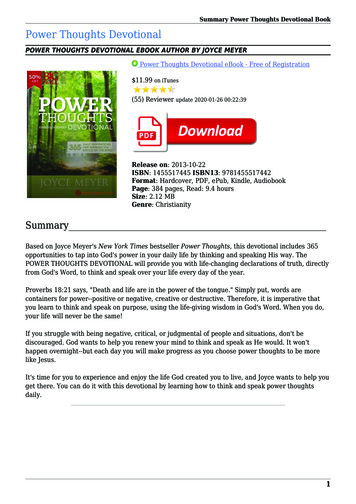

![Welcome [dashdiet.me]](/img/17/30-day-weight-loss-journal.jpg)
